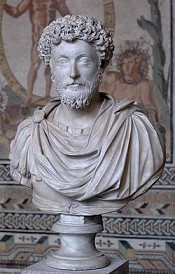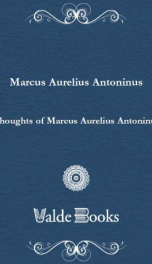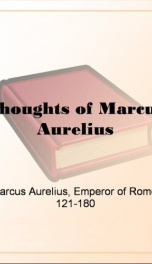Marcus Aurelius Emperor of Rome

Marcus Aurelius Antoninus Augustus[notes 1] (26 April 121 – 17 March 180) was Roman emperor from 161 to his death in 180. He ruled with Lucius Verus as co-emperor from 161 until Lucius' death in 169. He was the last of the "Five Good Emperors", and is also considered one of the most important Stoic philosophers. His tenure was marked by wars in Asia against a revitalized Parthian Empire, and with Germanic tribes along the Limes Germanicus into Gaul and across the Danube. A revolt in the East, led by Avidius Cassius who previously fought under Lucius Verus against the Parthians, failed. Marcus Aurelius' work Meditations, written in Greek while on campaign between 170 and 180, is still revered as a literary monument to a government of service and duty. The major sources for the life and rule of Marcus Aurelius are patchy and frequently unreliable. The biographies contained in the Historia Augusta claim to be written by a group of authors at the turn of the fourth century, but are in fact written by a single author (referred to here as "the biographer") from the later fourth century (c. 395). The later biographies and the biographies of subordinate emperors and usurpers are a tissue of lies and fiction, but the earlier biographies, derived primarily from now-lost earlier sources (Marius Maximus or Ignotus), are much better.[3] For Marcus' life and rule, the biographies of Hadrian, Pius, Marcus and Lucius Verus are largely reliable, but those of Aelius Verus and Avidius Cassius are full of fiction.[4] A body of correspondence between Marcus' tutor Fronto and various Antonine officials survives in a series of patchy manuscripts, covering the period from c. 138 to 166.[5] Marcus' own Meditations offer a window on his inner life, but are largely undateable, and make few specific references to worldly affairs.[6] The main narrative source for the period is Cassius Dio, a Greek senator from Bithynian Nicaea who wrote a history of Rome from its founding to 229 in eighty books. Dio is vital for the military history of the period, but his senatorial prejudices and strong opposition to imperial expansion obscure his perspective.[7] Some other literary sources provide specific detail: the writings of the physician Galen on the habits of the Antonine elite, the orations of Aelius Aristides on the temper of the times, and the constitutions preserved in the Digest and Codex Justinianus on Marcus' legal work.[8] Inscriptions and coin finds supplement the literary sources.[9] Marcus' family originated in Ucubi, a small town southeast of Córdoba in Iberian Baetica. The family rose to prominence in the late first century AD. Marcus' great-grandfather Marcus Annius Verus (I) was a senator and (according to the Historia Augusta) ex-praetor; in 73–74 his grandfather Marcus Annius Verus (II) was made a patrician.[10][notes 2] Verus' elder son—Marcus Aurelius' father—Marcus Annius Verus (III) married Domitia Lucilla.[13] Lucilla was the daughter of the patrician P. Calvisius Tullus Ruso and the elder Domitia Lucilla. The elder Domitia Lucilla had inherited a great fortune (described at length in one of Pliny's letters) from her maternal grandfather and her paternal grandfather by adoption.[14] The younger Lucilla would acquire much of her mother's wealth, including a large brickworks on the outskirts of Rome—a profitable enterprise in an era when the city was experiencing a construction boom.[15] Lucilla and Verus (III) had two children: a son, Marcus, born on 26 April 121, and Annia Cornificia Faustina, probably born in 122 or 123.[17] Verus (III) probably died in 124, during his praetorship, when Marcus was only three years old.[18][notes 3] Though he can hardly have known him, Marcus Aurelius wrote in his Meditations that he had learned "modesty and manliness" from his memories of his father and from the man's posthumous reputation.[20] Lucilla did not remarry.[18] Lucilla, following prevailing aristocratic customs, probably did not spend much time with her son. Marcus was in the care of "nurses".[21] Marcus credits his mother with teaching him "religious piety, simplicity in diet" and how to avoid "the ways of the rich".[22] In his letters, Marcus makes frequent and affectionate reference to her; he was grateful that, "although she was fated to die young, yet she spent her last years with me".[23] After his father's death, Aurelius was adopted by his paternal grandfather Marcus Annius Verus (II).[24] Another man, L. Catilius Severus, also participated in his upbringing. Severus is described as Marcus' "maternal great-grandfather"; he is probably the stepfather of the elder Lucilla.[24] Marcus was raised in his parents' home on the Caelian Hill, a district he would affectionately refer to as "my Caelian".[25] It was a upscale region, with few public buildings but many aristocratic villas. Marcus' grandfather owned his own palace beside the Lateran, where Marcus would spend much of his childhood.[26] Marcus thanks his grandfather for teaching him "good character and avoidance of bad temper".[27] He was less fond of the mistress his grandfather took and lived with after the death of Rupilia Faustina, his wife.[28] Marcus was grateful that he did not have to live with her longer than he did.[29] Marcus was taught at home, in line with contemporary aristocratic trends;[30] Marcus thanks Catilius Severus for encouraging him to avoid public schools.[31] One of his teachers, Diognetus, a painting-master, proved particularly influential; he seems to have introduced Marcus to the philosophic way of life.[32] In April 132, at the behest of Diognetus, Marcus took up the dress and habits of the philosopher: he studied while wearing a rough Greek cloak, and would sleep on the ground until his mother convinced him to sleep on a bed.[33] A new set of tutors—Alexander of Cotiaeum, Trosius Aper, and Tuticius Proculus[notes 4]—took over Marcus' education in about 132 or 133.[35] Little is known of the latter two (both teachers of Latin), but Alexander was a major littérateur, the leading Homeric scholar of his day.[36] Marcus thanks Alexander for his training in literary styling.[37] Alexander's influence—an emphasis on matter over style, on careful wording, with the occasional Homeric quotation—has been detected in Marcus' Meditations.[38] According to the notoriusly unreliable Historia Augusta, he is the great-great-great-great-great-great-great grandson of Triumvir Pompey the Great through his daughter Pompeia Magna. His paternal grandmother Rupilia was the great granddaughter of Scribonia (daughter of Lucius Scribonius Libo consul 16) , who was herself the great granddaughter of Pompey the Great on both her parents side. This makes Marcus Aurelius and his son Commodus, the only Princeps to have been directly related to the son-in-law and rival of Triumvir Julius Caesar. In 127, at the age of six, Marcus was enrolled in the equestrian order on the recommendation of Emperor Hadrian. Though this was not completely unprecedented, and other children are known to have joined the order, Marcus was still unusually young. In 128, Marcus was enrolled in the priestly college of the Salii. Since the standard qualifications for the college were not met—Marcus did not have two living parents—they must have been waived by Hadrian, Marcus' nominator, as a special favor to the child.[40] Hadrian had a strong affection for the child, and nicknamed him Verissimus, "most true".[41][notes 5] Marcus took his religious duties seriously. He rose through the offices of the priesthood, becoming in turn the leader of the dance, the vates (prophet), and the master of the order.[43] Hadrian did not see much of Marcus in his childhood. He spent most of his time outside Rome, on the frontier, or dealing with administrative and local affairs in the provinces.[notes 6] By 135, however, he had returned to Italy for good. He had grown close to Lucius Ceionius Commodus, husband of the daughter of Avidius Nigrinus, a dear friend of Hadrian who the emperor had killed early in his reign. In 136, shortly after Marcus assumed the toga virilis symbolizing his passage into manhood, Hadrian arranged for his engagement to one of Commodus' daughters, Fabia.[45] Marcus was made prefect of the city during the feriae Latinae soon after (he was probably appointed by Commodus). Although the office held no real administrative significance—the full-time prefect remained in office during the festival—it remained a prestigious office for young aristocrats and members of the imperial family. Marcus conducted himself well at the job.[46] Through Commodus, Marcus met Apollonius of Chalcedon, a Stoic philosopher. Apollonius had taught Commodus, and would be an enormous impact on Marcus, who would later study with him regularly. He is one of only three people Marcus thanks the gods for having met.[47] At about this time, Marcus' younger sister, Annia Cornificia, married Ummidius Quadratus, her first cousin. Domitia Lucilla asked Marcus to give part of his father's inheritance to his sister. He agreed to give her all of it, content as he was with his grandfather's estate.[48] In late 136, Hadrian almost died from a haemorrhage. Convalescent in his villa at Tivoli, he selected Lucius Ceionius Commodus as his successor, and adopted him as his son.[49] The selection was done invitis omnibus, "against the wishes of everyone";[50] its rationale is still unclear.[51] After a brief stationing on the Danube frontier, Lucius returned to Rome to make an address to the senate on the first day of 138. The night before the speech, however, he grew ill, and died of a haemorrhage later in the day.[52][notes 7] On 24 January 138, Hadrian selected Aurelius Antoninus as his new successor.[54] After a few days' consideration, Antoninus accepted. He was adopted on 25 February. As part of Hadrian's terms, Antoninus adopted Marcus and Lucius Commodus, the son of Aelius. Marcus became M. Aelius Aurelius Verus; Lucius became L. Aelius Aurelius Commodus. At Hadrian's request, Antoninus' daughter Faustina was betrothed to Lucius.[55] Marcus was appalled to learn that Hadrian had adopted him. Only with reluctance did he move from his mother's house on the Caelian to Hadrian's private home.[56]
do you like this author?
What readers are saying
What do you think? Write your own comment on this book!
write a commentWhat readers are saying
What do you think? Write your own comment on this author!
write a commentBook list

Meditations
Series:
Unknown
Year:
Unknown
Raiting:
4.5/5
“Meditations” of Marcus Aurelius, Roman emperor (AD 121–180) and Stoic philosopher, was actually titled by the author “The matters addressed to himself”. The volume represents his reflections, expressing a strong Stoic belief, written in periods of solitude. This is the first book Marcus Aurelius wrote concerning himself. Serving as educational supplies for students of Stoicism, it also offers an evocative look at the personal moral life of the Roman Emperor, most peaceful of warriors and a magnificent monarch.
Show more
add to favoritesadd In favorites

Thoughts of Marcus Aurelius Antoninus
Series:
Unknown
Year:
Unknown
Raiting:
3/5
Thoughts of Marcus Aurelius Antoninus. please visit www.valdebooks.com for a full list of titles
Show more
add to favoritesadd In favorites

Thoughts of Marcus Aurelius
Series:
Unknown
Year:
Unknown
Raiting:
1/5
This book was converted from its physical edition to the digital format by a community of volunteers. You may find it for free on the web. Purchase of the Kindle edition includes wireless delivery.
Show more
add to favoritesadd In favorites
Book list

Meditations
Series:
Unknown
Year:
Unknown
Raiting:
4.5/5
“Meditations” of Marcus Aurelius, Roman emperor (AD 121–180) and Stoic philosopher, was actually titled by the author “The matters addressed to himself”. The volume represents his reflections, expressing a strong Stoic belief, written in periods of solitude. This is the first book Marcus Aurelius wrote concerning himself. Serving as educational supplies for students of Stoicism, it also offers an evocative look at the personal moral life of the Roman Emperor, most peaceful of warriors and a magnificent monarch.
Show more
add to favoritesadd In favorites

Thoughts of Marcus Aurelius Antoninus
Series:
Unknown
Year:
Unknown
Raiting:
3/5
Thoughts of Marcus Aurelius Antoninus. please visit www.valdebooks.com for a full list of titles
Show more
add to favoritesadd In favorites

Thoughts of Marcus Aurelius
Series:
Unknown
Year:
Unknown
Raiting:
1/5
This book was converted from its physical edition to the digital format by a community of volunteers. You may find it for free on the web. Purchase of the Kindle edition includes wireless delivery.
Show more
add to favoritesadd In favorites
What readers are saying
What do you think? Write your own comment on this author!
write a commentif you like Marcus Aurelius Emperor of Rome try:
readers also enjoyed
What readers are saying
What do you think? Write your own comment on this author!
write a commentGenre
if you like Marcus Aurelius Emperor of Rome try:
readers also enjoyed
Do you want to exchange books? It’s EASY!
Get registered and find other users who want to give their favourite books to good hands!




